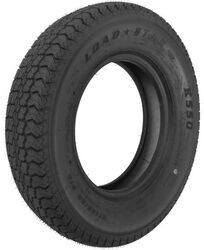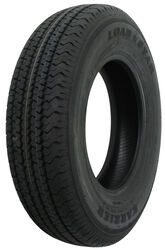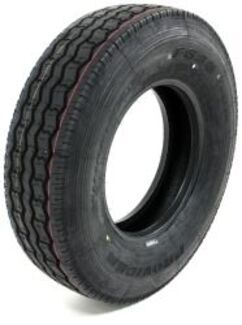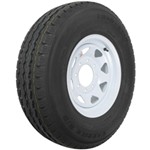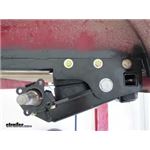
How to Select Trailer Tire Load Range and Speed Rating for Boat Trailer Towed on Interstate Highways
Question:
Hello. couple of questions concerning load range before I purchase tires. I have a boat trailer that needs new shoes... Im estimating that the boat / motor/ full tank of fuel 24 gallons and the trailer will top out at approx. 3100 lbs. The trailer is a single axle trailer. What load range should I go with. The original tires that came with the trailer were rated as C range... I replaced them 5 years or so ago and went with a D range tire but Im not sure what the formula is to figure out which load range you should have.. so 3100 lbs max on a single axle trailer? As for the tire itself I currently have Kenda load star range D , but almost all of my towing has only been 20 to 25 miles one way at around 55 mph. This year I plan to do a bit more trailering for longer distances and a little bit higher speed and the last thing I want is a blow out on the interstate.. Do you think the Kendas that I have on my trailer right now are up to the task Code: AM10210 if not please recommend something. and then theres the question of shelf life... Is there anyway of guaranteeing that tires purchased havent been sitting on a shelf for an extended time. I know a lot of questions, but would prefer to get them all out of the way with one email as opposed to 3 or 4.. Thank you for your help with this and I look forward to your answers...
asked by: ROLAND P
Helpful Expert Reply:
Trailer tires are available in both different weight Load Ranges, as you noted, but also in varying speed ratings. Like weight Load Range, these speed ratings are designated by a letter code. For example, a tire rated for highway speeds up to 81-mph is classified as having an M speed rating. This is the case for your current Kenda load range D tires # AM10210. Since you will now be towing your boat longer distances and at higher speeds you'll want to choose tires in your ST175/80R13 size that meet both your weight and speed requirements.
To select an appropriate load range tire take the trailer's gross weight (its GVWR found on its main identification plate) and divide by two, since two tires will split that total load. If your 3100-lb total is correct that means each tire will have to carry 1550-lbs. Naturally, you want to choose tires that will provide some safety margin as well. Tires that can handle more weight than you ask them to carry will tend to run cooler which is always a good thing.
You might consider towing the loaded boat/trailer to a weigh station so you can determine its actual weight on a truck scale.
The highest load range (LR) tire we offer in size ST175/80R13 is a LR D tire, good for 1610-lbs. Since this provides very little safety margin (based on your weight estimate) I suggest moving to a larger tire size, ST185/80-13. This tire size will fit on the same rims you have now but a LR D tire in size 185/80-13 offers a higher weight rating, 1710-lbs. You will just want to make sure that the 10mm wider tire (a bit less than 1/2-inch) will still clear the fenders, frame, etc.
Kenda tire # AM1ST79 is a ST185/80D13 bias ply tire that can handle 1710-lbs and that has a speed rating M, safe for up to 81-mph speed.
No matter what trailer tires you use, ALWAYS 1) maintain their pressure at the maximum cold psi pressure rating shown on the tire sidewall; 2) operate them within their weight capacity and 3) operate them within their speed rating. Incorrect pressure, overloading and driving too fast all create excess heat in a tire and heat is typically what causes tire failure.
As for tire age, trailer tires are mostly made overseas and by the time they are loaded in a shipping container, put on a cargo ship, warehoused stateside and shipped to a retailer they will typically be no less than 6 months old. Trailer tires are generally good for up to 6 years from production date.

Products Referenced in This Question
Loadstar ST185/80D13 Bias Trailer Tire - Load Range D
- Trailer Tires and Wheels
- Tire Only
- Bias Ply Tire
- Load Range D
- 185/80-13
- 13 Inch
- M - 81 mph
- Kenda
more information >
Product Page this Question was Asked From
Karrier ST175/80R13 Radial Trailer Tire - Load Range D
- Trailer Tires and Wheels
- Tire Only
- Radial Tire
- Load Range D
- 175/80-13
- 13 Inch
- M - 81 mph
- Kenda
more information >
Featured Help Information
Miscellaneous Media

Continue Researching
- Search Results: tongue locks
- Q&A: What Load Range Tires to Use for a 16,000 lb Trailer with 7,000 lb Axles
- Q&A: What Does Tire Capacity Difference Between Single and Dual Tires Mean
- Shop: Single Axle Trailer Fender w/ Backing Plate - Steel - 14" to 15" Wheels - Qty 1
- Shop: Curt Channel-Mount Coupler - 2-5/16" Ball - 12,000-lb Capacity
- Shop: Sleeve-Lock Trailer Coupler - Adjustable Channel Mount - Black - 2" Ball - 7,000 lbs
- Shop: JR Products Vertical 2-Stage Propane Regulator
- Shop: JR Products Compact Automatic Changeover 2-Stage Propane Regulator
- Video: JR Products Compact Low Pressure 2-Stage Automatic Changeover RV LP Gas Regulator Review
- Shop: Trailer Hitch
- Article: Trailer Wiring Diagrams
- Search Results: 44649
- Q&A: Hub And Drum Replacement for 90865 Rockwell Hub and Drum
- Video: Timbren Axle-Less Trailer Suspension System Installation
- Shop: etrailer Electric Trailer Brakes - 12" - Left/Right Hand Assemblies - 5,200 lbs to 7,000 lbs
- Shop: Trailer Wiring
- Q&A: Recommended Components for Off-Road Trailer Similar to Chevy Colorado Wheels
- Article: Trailer Tire Sizing
- Search Results: 25580
- Shop: Grease Seals 10-36 (pair)
- Shop: Fifth Wheel Hitch
- Article: Brake Controller 7- and 4-Way Installation Kit (ETBC7)
- Q&A: 05680-C Master Cylinder Replacement for Trailer Recommendation
- Search Results: 68149
- Shop: Gooseneck Hitch
- Q&A: Lug Nut Torque Chart for Trailer Wheels
- Article: How to Choose the Right Trailer Hitch Class
- Search Results: dust cap
- Video: Thule Carbon Bike Frame Protector Review
- Q&A: 2022 Toyota Highlander Wiring for a 7-Way Blade Connector




